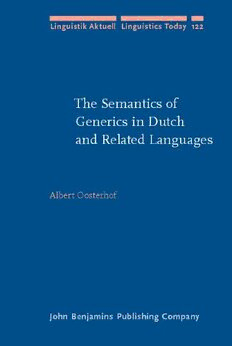
The Semantics of Generics in Dutch and Related Languages PDF
309 Pages·2008·2.875 MB·
Most books are stored in the elastic cloud where traffic is expensive. For this reason, we have a limit on daily download.
Preview The Semantics of Generics in Dutch and Related Languages
Description:
This monograph is a comprehensive study of the various ways in which genericity can be expressed in Dutch, dialects of Dutch, and languages related to Dutch. On the basis of empirical (corpus- and questionnaire-based) data, a wide range of topics are discussed which have been addressed in the literature on the semantics and pragmatics of generics. The empirical data presented in this book shed new light on issues crucial to the study of genericity. A number of widely accepted ideas are shown to be problematic. For example, arguments are presented against the well-known claim that progressive forms typically exclude characterizing interpretations. Furthermore, the author shows that speakers do not agree in their judgements of the acceptability of bare plurals (as well as other noun phrase types) in generic contexts. Such data are a problem for the influential thesis that bare plurals refer to kinds unambiguously.
See more
The list of books you might like
Most books are stored in the elastic cloud where traffic is expensive. For this reason, we have a limit on daily download.
